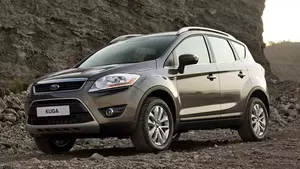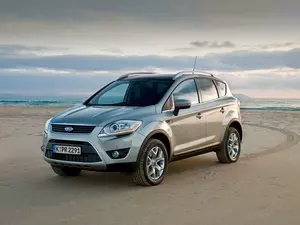
| Vehicle | Curb weight | Difference from world's smallest | Weight to power ratio | 0—60 mph acceleration ratio | Consumption ratio |
|---|---|---|---|---|---|
| 1.5 EcoBoost |
1489 kg / 3283 lbs |
1064 kg (2346 lbs) heavier | 10 kg to 1 hp | 162 kg/s (357 lbs/s) | - |
| 2.0 EcoBlue |
1660 kg / 3660 lbs |
1235 kg (2723 lbs) heavier | 9 kg to 1 hp | 200 kg/s (441 lbs/s) | - |
| 1.5 EcoBlue |
1501 kg / 3310 lbs |
1076 kg (2373 lbs) heavier | 13 kg to 1 hp | 135 kg/s (298 lbs/s) | - |
| 2.5 Duratec |
1769 kg / 3901 lbs |
1344 kg (2964 lbs) heavier | 8 kg to 1 hp | 203 kg/s (448 lbs/s) | - |
| Vehicle | 1.5 EcoBoost |
|---|---|
| Curb weight |
1489 kg / 3283 lbs |
| Difference from world's smallest | 1064 kg (1064 lbs) heavier |
| Weight to power ratio | 10 kg to 1 hp |
| 0—60 mph acceleration ratio | 162 kg/s (357 lbs/s) |
| Consumption ratio | - |
| Vehicle | 2.0 EcoBlue |
| Curb weight |
1660 kg / 3660 lbs |
| Difference from world's smallest | 1235 kg (1235 lbs) heavier |
| Weight to power ratio | 9 kg to 1 hp |
| 0—60 mph acceleration ratio | 200 kg/s (441 lbs/s) |
| Consumption ratio | - |
| Vehicle | 1.5 EcoBlue |
| Curb weight |
1501 kg / 3310 lbs |
| Difference from world's smallest | 1076 kg (1076 lbs) heavier |
| Weight to power ratio | 13 kg to 1 hp |
| 0—60 mph acceleration ratio | 135 kg/s (298 lbs/s) |
| Consumption ratio | - |
| Vehicle | 2.5 Duratec |
| Curb weight |
1769 kg / 3901 lbs |
| Difference from world's smallest | 1344 kg (1344 lbs) heavier |
| Weight to power ratio | 8 kg to 1 hp |
| 0—60 mph acceleration ratio | 203 kg/s (448 lbs/s) |
| Consumption ratio | - |

| Vehicle | Curb weight | Difference from world's smallest | Weight to power ratio | 0—60 mph acceleration ratio | Consumption ratio |
|---|---|---|---|---|---|
| 1.5 EcoBoost |
1579 kg / 3482 lbs |
1154 kg (2545 lbs) heavier | 11 kg to 1 hp | 172 kg/s (379 lbs/s) |
251 kg/L (553 lbs/L) |
| 2.0 TDCI |
1614 kg / 3559 lbs |
1189 kg (2622 lbs) heavier | 11 kg to 1 hp | 168 kg/s (370 lbs/s) |
343 kg/L (756 lbs/L) |
| 1.5 TDCI |
1605 kg / 3539 lbs |
1180 kg (2602 lbs) heavier | 13 kg to 1 hp | 136 kg/s (300 lbs/s) |
334 kg/L (736 lbs/L) |
| 2.0 EcoBoost |
1702 kg / 3753 lbs |
1277 kg (2816 lbs) heavier | 7 kg to 1 hp | 203 kg/s (448 lbs/s) |
196 kg/L (432 lbs/L) |
| Vehicle | 1.5 EcoBoost |
|---|---|
| Curb weight |
1579 kg / 3482 lbs |
| Difference from world's smallest | 1154 kg (1154 lbs) heavier |
| Weight to power ratio | 11 kg to 1 hp |
| 0—60 mph acceleration ratio | 172 kg/s (379 lbs/s) |
| Consumption ratio |
251 kg/L (553 lbs/L) |
| Vehicle | 2.0 TDCI |
| Curb weight |
1614 kg / 3559 lbs |
| Difference from world's smallest | 1189 kg (1189 lbs) heavier |
| Weight to power ratio | 11 kg to 1 hp |
| 0—60 mph acceleration ratio | 168 kg/s (370 lbs/s) |
| Consumption ratio |
343 kg/L (756 lbs/L) |
| Vehicle | 1.5 TDCI |
| Curb weight |
1605 kg / 3539 lbs |
| Difference from world's smallest | 1180 kg (1180 lbs) heavier |
| Weight to power ratio | 13 kg to 1 hp |
| 0—60 mph acceleration ratio | 136 kg/s (300 lbs/s) |
| Consumption ratio |
334 kg/L (736 lbs/L) |
| Vehicle | 2.0 EcoBoost |
| Curb weight |
1702 kg / 3753 lbs |
| Difference from world's smallest | 1277 kg (1277 lbs) heavier |
| Weight to power ratio | 7 kg to 1 hp |
| 0—60 mph acceleration ratio | 203 kg/s (448 lbs/s) |
| Consumption ratio |
196 kg/L (432 lbs/L) |

| Vehicle | Curb weight | Difference from world's smallest | Weight to power ratio | 0—60 mph acceleration ratio | Consumption ratio |
|---|---|---|---|---|---|
| 1.6 EcoBoost |
1682 kg / 3709 lbs |
1257 kg (2772 lbs) heavier | 11 kg to 1 hp | 183 kg/s (404 lbs/s) |
218 kg/L (481 lbs/L) |
| 2.0 TDCi |
1707 kg / 3764 lbs |
1282 kg (2827 lbs) heavier | 10 kg to 1 hp | 172 kg/s (379 lbs/s) |
275 kg/L (606 lbs/L) |
| Vehicle | 1.6 EcoBoost |
|---|---|
| Curb weight |
1682 kg / 3709 lbs |
| Difference from world's smallest | 1257 kg (1257 lbs) heavier |
| Weight to power ratio | 11 kg to 1 hp |
| 0—60 mph acceleration ratio | 183 kg/s (404 lbs/s) |
| Consumption ratio |
218 kg/L (481 lbs/L) |
| Vehicle | 2.0 TDCi |
| Curb weight |
1707 kg / 3764 lbs |
| Difference from world's smallest | 1282 kg (1282 lbs) heavier |
| Weight to power ratio | 10 kg to 1 hp |
| 0—60 mph acceleration ratio | 172 kg/s (379 lbs/s) |
| Consumption ratio |
275 kg/L (606 lbs/L) |

| Vehicle | Curb weight | Difference from world's smallest | Weight to power ratio | 0—60 mph acceleration ratio | Consumption ratio |
|---|---|---|---|---|---|
| 2.0 Duratorq TDCi |
1707 kg / 3764 lbs |
1282 kg (2827 lbs) heavier | 12 kg to 1 hp | 161 kg/s (355 lbs/s) |
275 kg/L (606 lbs/L) |
| Vehicle | 2.0 Duratorq TDCi |
|---|---|
| Curb weight |
1707 kg / 3764 lbs |
| Difference from world's smallest | 1282 kg (1282 lbs) heavier |
| Weight to power ratio | 12 kg to 1 hp |
| 0—60 mph acceleration ratio | 161 kg/s (355 lbs/s) |
| Consumption ratio |
275 kg/L (606 lbs/L) |

| Vehicle | Curb weight | Difference from world's smallest | Weight to power ratio | 0—60 mph acceleration ratio | Consumption ratio |
|---|---|---|---|---|---|
| 2.0 TDCi |
2100 kg / 4631 lbs |
1675 kg (3694 lbs) heavier | 15 kg to 1 hp | 208 kg/s (459 lbs/s) |
333 kg/L (734 lbs/L) |
| 2.5 i 20V |
1613 kg / 3557 lbs |
1188 kg (2620 lbs) heavier | 8 kg to 1 hp | 192 kg/s (423 lbs/s) |
157 kg/L (346 lbs/L) |
| Vehicle | 2.0 TDCi |
|---|---|
| Curb weight |
2100 kg / 4631 lbs |
| Difference from world's smallest | 1675 kg (1675 lbs) heavier |
| Weight to power ratio | 15 kg to 1 hp |
| 0—60 mph acceleration ratio | 208 kg/s (459 lbs/s) |
| Consumption ratio |
333 kg/L (734 lbs/L) |
| Vehicle | 2.5 i 20V |
| Curb weight |
1613 kg / 3557 lbs |
| Difference from world's smallest | 1188 kg (1188 lbs) heavier |
| Weight to power ratio | 8 kg to 1 hp |
| 0—60 mph acceleration ratio | 192 kg/s (423 lbs/s) |
| Consumption ratio |
157 kg/L (346 lbs/L) |